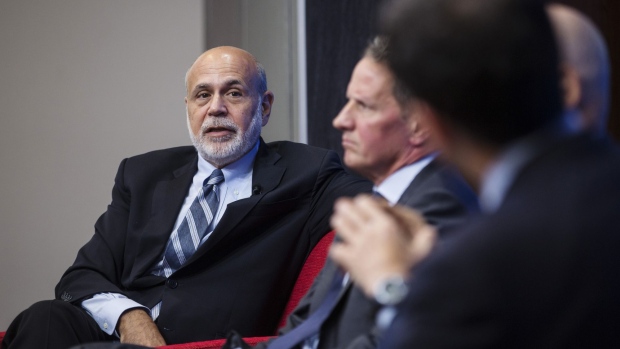Oct 10, 2022
Bernanke Urges Attention to Crisis Risks Amid War, Dollar Surge
, Bloomberg News

(Bloomberg) -- Former Federal Reserve Chair Ben Bernanke, who won the Nobel Prize in Economics on Monday for his research on financial crises, urged policy makers to watch for any worsening of financial conditions around the world as pressures from war and currency fluctuations squeeze economies.
“Even if financial problems don’t begin an episode, over time, if the episode makes financial conditions worse, they can add to the problem and intensify it, so that’s something I think that we really have to pay close attention to,” Bernanke said Monday during a press briefing at the Brookings Institution in Washington, where he’s a senior fellow.
While the US financial system is in better shape than it was ahead of the global crisis in the late 2000s, he discussed concerns elsewhere. In Europe, for example, financial institutions could be pressured by shutdowns of natural gas flows due to Russia’s invasion of Ukraine, while emerging markets “are facing a very strong dollar and a lot of capital outflows,” he said.
Earlier Monday, the Royal Swedish Academy of Sciences announced the Nobel award to Bernanke, Douglas Diamond of the University of Chicago and Washington University’s Philip Dybvig for their research into banking and financial crises.
Diamond, in a separate press briefing on Monday, said central bankers should proceed carefully as they raise interest rates to prevent fear and “self-fulfilling prophecy” from creating financial instability.
Bank Failures
A self-described “Great Depression buff,” Bernanke was cited by the academy for his work on that era. In a 1983 paper, he showed that the downturn became so deep and so protracted in large part because bank failures severely contracted credit, doing significant damage to the economy.
He later put that research to work when he was a Fed chair and the economy was hit by a financial crisis in 2008 and 2009 arising out of a housing bubble that went bust. While he was initially slow to recognize the potential ramifications of falling home prices for the financial system, Bernanke worked feverishly afterward in combating the crisis and preventing it from turning another depression.
Today, while there may be some financial-stability risks in the US, “We’re certainly not in anything like the dire straits we were in 14 years ago,” Bernanke said Monday.
Diamond, for his part, sees the banking system in much better shape than it was in 2008 during the financial crisis, partly because of new regulation. And while he declined to comment on current concerns over US inflation and monetary policy, in the long term he suggested the Fed “has done remarkably well in terms of financial stability.”
Bernanke said the Fed nevertheless still faces “a very difficult challenge” in trying to engineer a soft landing for the economy in which it brings inflation down without triggering a recession.
Jumbo Hike
US central bankers appear to be readying yet another jumbo interest rate hike as they try to slow the economy to lower inflation when they next meet Nov. 1-2.
Inflation -- as measured by the personal consumption expenditures price index -- clocked in at year-over-year rate of 6.2% in August, the 18th consecutive month it’s been above the Fed’s 2% target.
Under Bernanke, the Fed adopted the 2% objective in 2012, putting in practice some of the research he did showing the usefulness of inflation targets in helping central banks manage the ups and downs of their economies.
“What should be kept in mind is that the inflation target is a medium-term target,” Bernanke said. “It doesn’t have to be met within six months or anything like that.”
As the economy slows in response to the Fed’s interest rate increases, policy makers “will begin to balance” their twin objectives of price stability and maximum employment in setting monetary policy, he said.
(Adds Bernanke comments from 10th paragraph onwards)
©2022 Bloomberg L.P.






